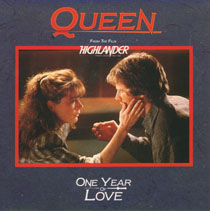| "One Year of Love" | ||||
|---|---|---|---|---|
 French single picture sleeve | ||||
| Single by Queen | ||||
| from the album A Kind of Magic | ||||
| B-side | "Gimme the Prize (Kurgan's Theme)" | |||
| Released | September 1986 (France) [1] | |||
| Recorded | 1985 | |||
| Studio | Townhouse, London | |||
| Genre | Soul [2] | |||
| Length | 4:26 | |||
| Label | EMI | |||
| Songwriter | John Deacon | |||
| Producers |
| |||
| Queen singles chronology | ||||
| ||||
"One Year of Love" is a song by the British rock band Queen, written by John Deacon, originally released on their twelfth studio album A Kind of Magic in 1986.